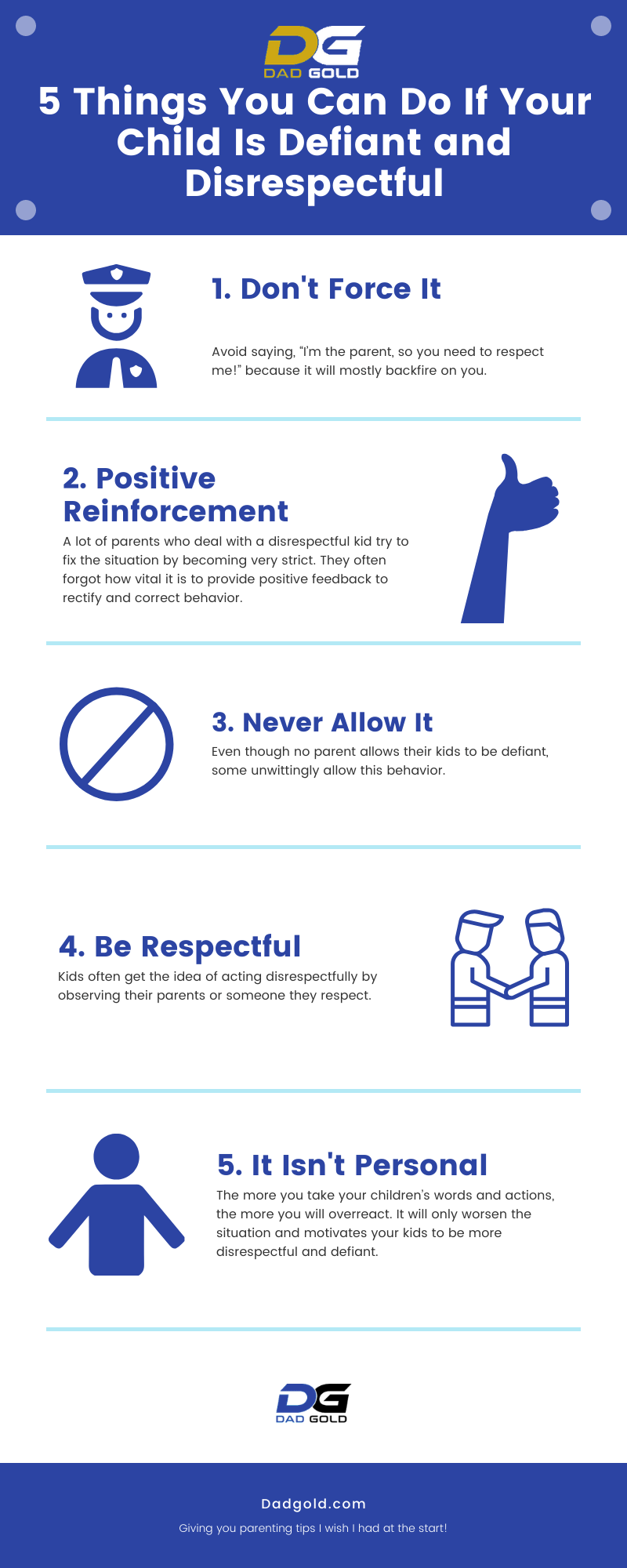Playtime in the park is done, and you tell your child that you need to go home. He won’t listen, so you gave a five-minute warning. But your kid talks back disrespectfully, then you feel the anger rises in you. You yell at him, and as you’re dragging him to go home, he began screaming and kicking.
Defiant and disrespectful behavior such as yelling, name-calling, refusing requests, arguing, cursing, and ignoring you is a sort of warning to parents.
You can’t teach your children to be respectful if you treat them with disrespect. You need to understand first why your child is defiant and disrespectful for you to find the right solution.
What you will learn in this post:
- 5 reasons why your child is defiant and disrespectful
- 5 things you can do to help
- Frequently asked questions

5 Common Reasons Why Your Child is Defiant and Disrespectful
Even though most parents are very attentive about their child’s treatment towards other people, expecting nice and respectful actions, those same parents usually have children who treat them rudely.
Defiant and disrespectful behavior usually happens because children have insufficient problem-solving abilities and less knowledge about how to become more respectful.
Usually, when children separate from their parents, they do the wrong things before doing the right thing. Here are some of the common reasons why your child is defiant and disrespectful.
Confused About Limitations
If you’re confused or not clear in setting about a limitation yourself, kids will react and be disrespectful. They will get the message from you that the thing is free for everyone or an unspecified area and is okay for grabs.
Say, if you sometimes allow your kid to use the tablet every morning and sometimes don’t, then you can’t expect them to follow your rules all the time. It would help if you were firm with the restrictions and set consequences when someone breaks the limits.
-

Bold Male Pride – Baseball Trucker Cap Celebrating Masculinity
£18.00 Select options This product has multiple variants. The options may be chosen on the product page -

Dad Bod Appreciation Gift Mug
£14.00 Add to cart -

Dad Bod, Bad Jokes Structured Baseball Cap
£22.00 Select options This product has multiple variants. The options may be chosen on the product page
Over Controlled
Many kids become defiant and disrespectful when a home is full of control and fear-based parenting. With low support and under the pressures of high expectations, kids start to feel like they won’t lose anything.
The children will resent the feeling of being controlled. That’s why they may lie, sneak around, or rebel. At the age of 5, lying is normal for kids, but it might be a sign of too much control of their parents. They are afraid that you will scold or punish them a lot, that’s why they don’t want to tell the truth.
Over Stressed
Like any other individual, if kids feel too much stress, they will certainly become defiant and disrespectful. Unluckily, young children nowadays are already experiencing unnecessary stress to do their best in academics.
Kids need time to rest and deserve long periods of uninterrupted play every day. If they won’t get enough de-stressors, and all they think about is the academic goals they need to achieve, they will feel a lot of stress, making them defiant and disrespectful.
Trying To Connect
If you don’t spend enough time with your children, they may feel left behind and cast out. As a result of getting less connection and getting attention, they tend to break something, yell, or hurt someone.
However, it’s not about attention since it’s all about connection. Children need your touch, eye contact, and open hearts, and not the serious look on your face. If they don’t get the connection they need, they will settle for being disrespectful.
Worried
If your kid is worried about an impending transition like a new babysitter, a new job, a new school, a new baby on the way, a new house, or a sick grandparent, you can’t expect him to express his thoughts nicely.
If you have an idea about his worries, speak with him during a calm moment, such as a long drive or bedtime.
Don’t disregard their worries, but let him know what they can do about it. Talk to him with honesty, but also be positive and with authority.
5 Things You Can Do If Your Child Is Defiant and Disrespectful
At some point in a parent’s life, you need to deal with your child being defiant or disrespectful. Whether they are only ignoring your requests or started insulting and cursing you, your children will sometimes disrespectfully express themselves.
So, it would be best to understand that this is not your fault and comes for different reasons. Don’t worry because, with the appropriate approach, you can correct your child’s defiant and disrespectful behavior.

Don’t Force It
Avoid saying, “I’m the parent, so you need to respect me!” because it will mostly backfire on you.
Instead of controlling how your kid should treat you, concentrate more on his behavior. Remind him that he needs to obey the rules whether he likes it or not. Highlight the fact that being disrespectful is wrong, no matter how a person feels.
Positive Reinforcement
Many parents who deal with a disrespectful kid try to fix the situation by becoming very strict. They often forgot how vital it is to provide positive feedback to rectify and correct behavior.
If your children make an effort to follow you, give them praise as a reward. Also, proactively acknowledge all the good things that they do.
Never Allow It
Even though no parent allows their kids to be defiant, some unwittingly allow this behavior.
Let him know that voicing out his feelings is okay, but being disrespectful is not. Talk about some respectful ways to manage a situation, such as politely discussing your child’s rules about doing his homework.
It is vital that you do not allow this behavior or when your child is mean and rude.
Be Respectful
Kids often get the idea of acting disrespectfully by observing their parents or someone they respect.
One of the best things you can do to avoid defiant and disrespectful behavior is to display healthy anger management methods. Be courteous and polite in front of your kids even if you’re handling someone difficult and never speak negatively about other people behind their backs.
It Isn’t Personal
The more you take your children’s words and actions, the more you will overreact. It will only worsen the situation and motivates your kids to be more disrespectful and defiant.
Rather, let the small gestures slide altogether like eye rolls and sighs. Moreover, it would help if you evaluated which behaviors are really out of control objectively. Concentrate on rectifying these bad manners by using calm and constant discipline.
Frequently Asked Questions
Why is my child so disobedient?
It is most likely one of two reasons. 1. They have gotten away with it in the past, so they will keep doing it. 2. They have never had to answer for their behavior before. Now is the time to address both of these issues before it gets out of control.
How do you get a defiant child to obey you?
You need to make them responsible for their own behavior. If they think they are old enough to be defiant, then they should take responsibility. Also, positive responses to good behavior is an important part of your role is getting through this!
How do you deal with a difficult child behavior?
I deal with difficult behavior in children by making them responsible for their own actions, and by rewarding good behavior.
Conclusion
Kids can become defiant and disrespectful when they don’t like a certain situation or deal with difficult problems in their life.
The most significant thing to keep in mind is to remain calm and act respectfully in front of them. Understand why they’re acting in this behavior and discuss it maturely with them.
Good luck!




